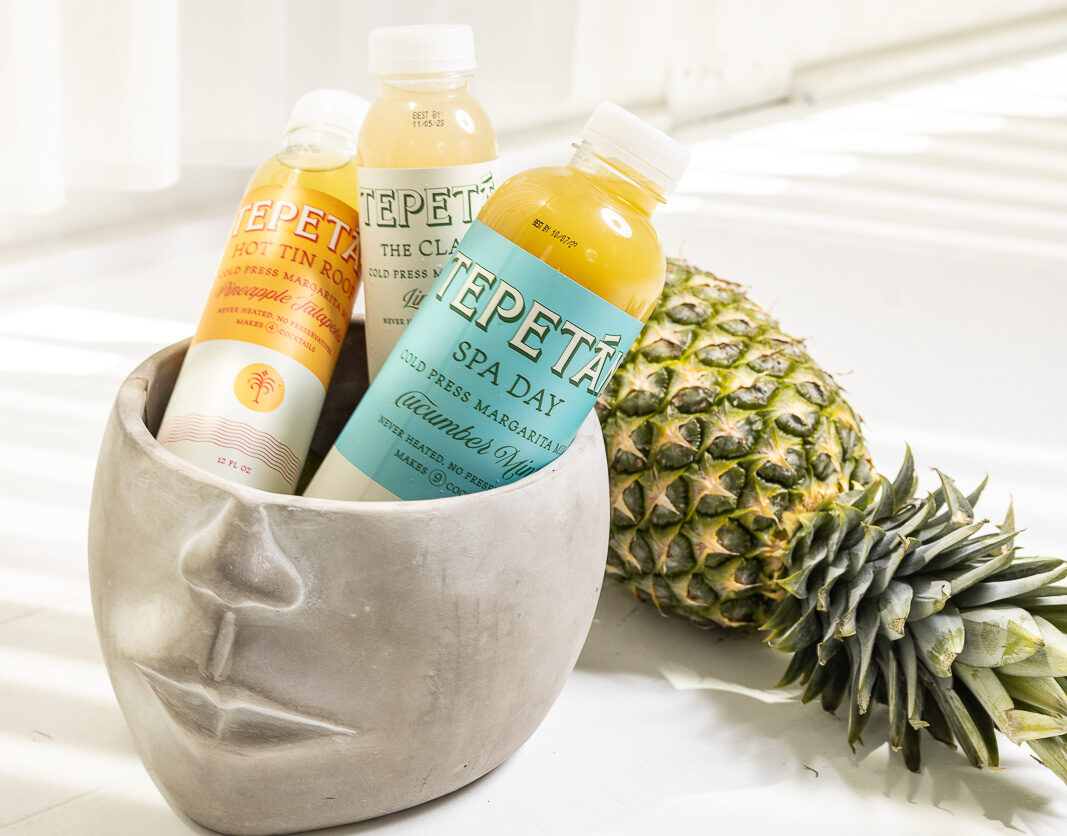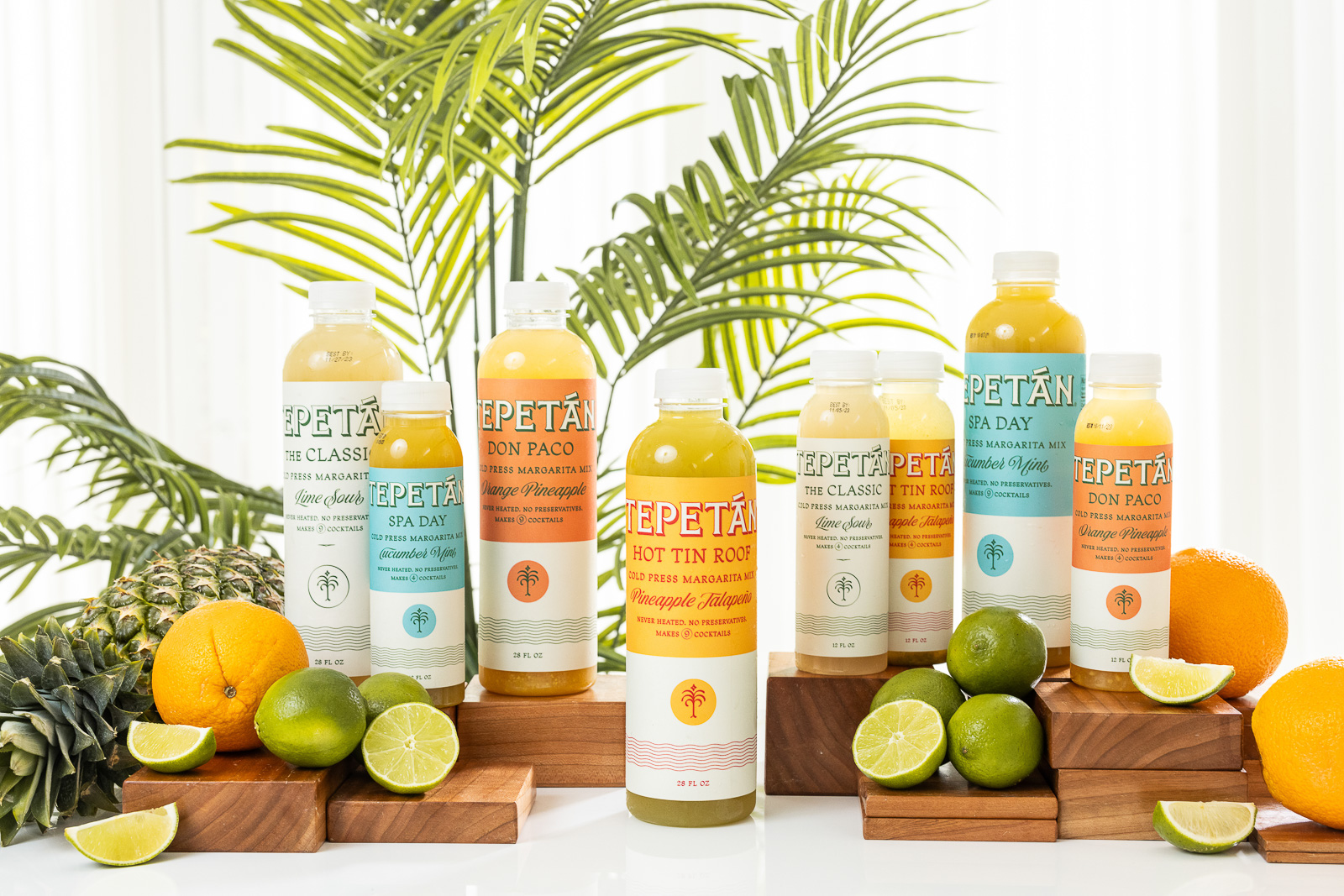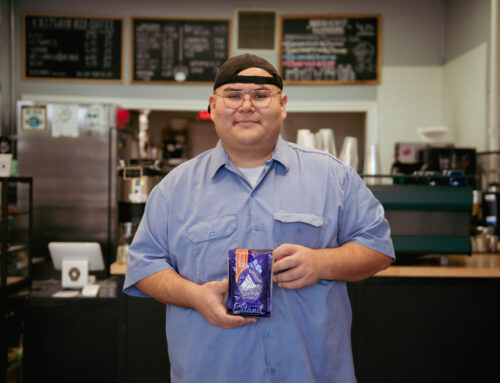The cocktail of the Lone Star State, served on the rocks or frozen. Occasionally swirled, often rimmed in salt or Tajín. Perfect in the summer but delicious year-round. You know it. You love it.
The margarita is hallowed for its simplicity and its ubiquity.
And Kessler Park couple Chris and Elsa DeGroot are making the three-ingredient drink even simpler.
In 2020, homebound by the pandemic, the DeGroots began tinkering with their margarita recipe. Three years later, the couple juices as many as 12,000 limes on batch days, and Tepetán, a cold press margarita mixer sold in four flavors, can be found on the shelves of local stores, Spec’s and Central Market.
“We’re in too deep to turn around,” Elsa says.
The idea for a cold press margarita mixer company came from Chris, who, even before leaving his job as an airline executive, had done “light weekend research” on the cold press technique.
Cold pressing a liquid is a process that ensures harmful bacteria are unable to grow without cooking the liquid itself, as is standard in the pasteurization process.
It’s a technique that has been around “forever” but is “incredibly difficult to pull off.”
And it’s what sets the finished Tepetán product apart from margarita mixers that may not be made with fresh ingredients or lose their fresh taste through pasteurization.
A finished bottle of Tepetán is put into a steel tank and is flooded with cold, pressurized water. (The DeGroots have moved out of their home kitchen and into an industrial-sized space.) As cold water is forced into the tank, the pressure works at a “molecular level.”
“This is the part that’s hard to get your head around, is it doesn’t squeeze the bottles. The juice is the same density as the water that’s coming in,” Chris says. “It inactivates anything that’s dangerous but leaves the things that make something taste fresh like your vitamin C, and all those things. Those are largely left alone.”
On top of learning about cold pressing juices, Chris read textbooks and academic articles that dove into topics like mixology, and the technicalities of juicing a pineapple or lime.
“On the back of my mind was, ‘Why hasn’t anyone done this type of thing?’” Chris says. “So it turns out nobody’s done it because it’s really freaking hard.”
While Chris “tinkered,” Elsa says she felt like she had a “crazy scientist” in her house. Neighbors who could see Chris experimenting with equipment through the DeGroots’ kitchen window began referring to him as Beaker.
The rest of 2020 was spent making margaritas and testing recipes, Elsa says.
Elsa says she’d enjoyed taking entrepreneurship classes while a student in the McCombs School of Business, but with two children and a mortgage, she was “terrified” at the prospect of the business failing.
“It just got stronger and the passion got bigger and then I started getting excited when I saw the final products,” Elsa says. “There were a lot of margaritas at home. We had a lot of friends come over and taste different iterations of recipes.”
They settled on four, perfected recipes: Lime Sour, Orange Pineapple, Hot Tin Roof — an orange and jalapeño mix — and Spa Day, made from cucumber and mint.
Before launching in stores, they had to settle on a name. And they landed on Tepetán.
While it’s a made-up word, Tepetán carries symbolic meaning for the couple. Originally from El Salvador, Elsa enjoyed the sound of the letters “tepe,” which appear in many town names in her native country. Tepe also means “the hill” in indigenous languages from Mexico and El Salvador, which reminded the couple of their main belief — that a good margarita makes you feel like you’ve been transported to vacation.
First, Tepetán got onto the shelves of 10 stores. Then 15. Then 20.
Elsa walked into retailers and liquor stores to market the juices. She says she often found that if she could get someone to try one, she could get them to carry the product.
“I think proving ourselves and showing that the philosophy of the product is good really gave us confidence to be like, OK, we can start thinking about other retailers. And my dream has always been Central Market,” Elsa says.
Central Market is no small beast, but it’s necessary to make it in the Texas market, Chris says.
Earlier this summer, Tepetán recieved permanent approval to be on Central Market’s shelves. For a couple whose early dates consisted of homemade margaritas (part of Chris’ “charm,” Elsa says), the journey has been long but delicious.
“We get a lot of momentum and fuel from seeing people enjoy it,” Elsa says. “We just get true fans and true enthusiasm that are not just from our friends and family. For me, that really makes some of the long days that we’ve had just worth it.”








